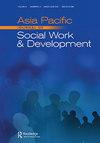韩国工作家庭的多维贫困
IF 1
4区 社会学
Q3 SOCIAL WORK
Asia Pacific Journal of Social Work and Development
Pub Date : 2020-10-23
DOI:10.1080/02185385.2020.1837660
引用次数: 1
摘要
本研究通过将家庭收入与物质匮乏相结合,考察了韩国的多维工作贫困。它的目的是捕捉工作贫困的现实,这是不能充分反映收入衡量单独。通过使用2018年韩国福利委员会研究的数据,本研究揭示了三个主要发现:(a)韩国的物质剥夺率相对较低,尽管一些家庭仍然遭受着影响生活质量的剥夺;(b)一些工作家庭虽然收入高,但生活拮据;(c)户主从事不稳定工作的工作家庭更有可能遭受物质匮乏或收入贫穷。未来的研究应扩大剥夺措施,并采用纵向方法来确定更多关于长期陷入贫困的人。在政策方面,一个更为慷慨的社会保护计划是必要的。本文章由计算机程序翻译,如有差异,请以英文原文为准。
Multidimensional poverty among working households in South Korea
ABSTRACT The present study examines multidimensional working poverty in South Korea by combining household income with material deprivation. It aims to capture the reality of working poverty, which is not adequately captured by the income measurement alone. By using data from the Korean Welfare Panel study in 2018, this study revealed three main findings: (a) the material deprivation rate was relatively low in Korea, although some households still suffered from deprivation influencing quality of life; (b) some working households experienced deprivation despite their high income; (c) working households whose heads were engaged in precarious employment were more likely to suffer from either material deprivation or income poverty. Future research should expand the deprivation measure and apply the longitudinal approach to determine more about people trapped in poverty in the long run. In terms of policy, a more generous social protection scheme is necessary for the working poor.
求助全文
通过发布文献求助,成功后即可免费获取论文全文。
去求助
来源期刊

Asia Pacific Journal of Social Work and Development
SOCIAL WORK-
CiteScore
4.10
自引率
5.00%
发文量
21
 求助内容:
求助内容: 应助结果提醒方式:
应助结果提醒方式:


